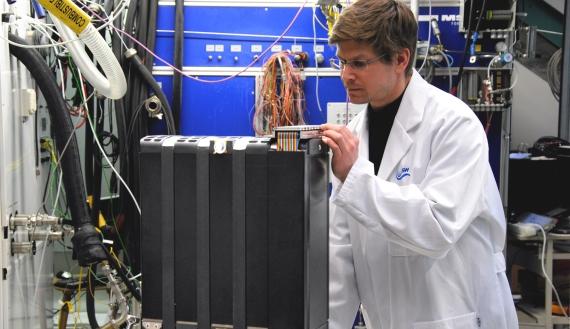
Great news for the fuel cell industry: Germany has launched a ~€60-million, three-year consortium of leading industrial companies to investigate high-volume production of automotive fuel cell stacks. As this recent national initiative builds on the successful outcome of FCH JU research projects, the FCH JU is thrilled to see its support leading to the next step towards mass fuel cell manufacturing in Germany.
The consortium, which is lead by BMW, comprises leading German companies in the fields of automotive and fuel cell technology: BMW AG; Daimler AG; Reinz-Dichtungs GmbH (DANA); Ford Research and Innovation Center Aachen; Freudenberg Performance Materials SE & Co. KG; Greenerity GmbH; NuCellSys GmbH; Powercell Sweden AB; Umicore AG & Co. KG; Volkswagen AG; and Zentrum für Sonnenenergie- und Wasserstoff-Forschung Baden-Württemberg. The project is part of the National Innovation Program for Hydrogen and Fuel Cell Technology (NIP) coordinated by the National Organization for Hydrogen and Fuel Cell Technology (NOW).
This is a joint initiative of the German automotive and supply industries and aims to provide the technical, economic and technological basis for the commercial introduction of fuel cell vehicles in Germany and Europe by 2020.
Fostering the collaboration between car manufacturers and suppliers has always been key to unable mass production processes. In this area, the FCH JU support has been strategic, mainly thanks to projects such as STACKTEST, AUTO-STACK and the most recent initiative AUTO-STACK Core. The latter established a platform concept to substantially improve economies of scale and reduce critical investment costs for individual manufacturers. FCH JU AUTO-STACK Core contributed to defining a single stack design and hardware for automotive standards. This approach addressed some of the most critical research, development and cost-efficiency challenges of fuel cell stack manufacturing and commercialisation. The AUTO-STACK Core will finish by 31st July and was a nearly 15 million Euro project of which 7.5 million was funded by the FCH JU.
Read more about FCH JU stack projects here.
FCH JU initiatives have brought together key stakeholders, especially small and medium-sized enterprises, in a collaborative effort to make state-of-the-art fuel cell stack production commercially viable in Europe. As such, it has helped creating a supply chain allowing for standardisation process of stack production and impacting cost reduction enabling first stage commercialisation process.
The new German "Autostack industry" project will act as the natural follow-up of the FCH JU projects, enabling the transition from hand manufacturing to automated assembly, which is a prerequisite for a broad market launch of fuel cell vehicles. With this new project, all the puzzle pieces will be put into place to industrialise the production of fuel cells for automobiles. The thrust of this efforts is to boost fuel cells' performance, service life and reliability while cutting costs.
This new project highlights the role European research projects can play acting as a frame to empower national initiatives. A great example highlighting how industry collaborates with research, harnessing the European research & innovation field.
Read more about the new “AutoStack-Industrie” project on:
- the "Green Car Congress" website here
- elective.net here
Details
- Publication date
- 10 July 2017
